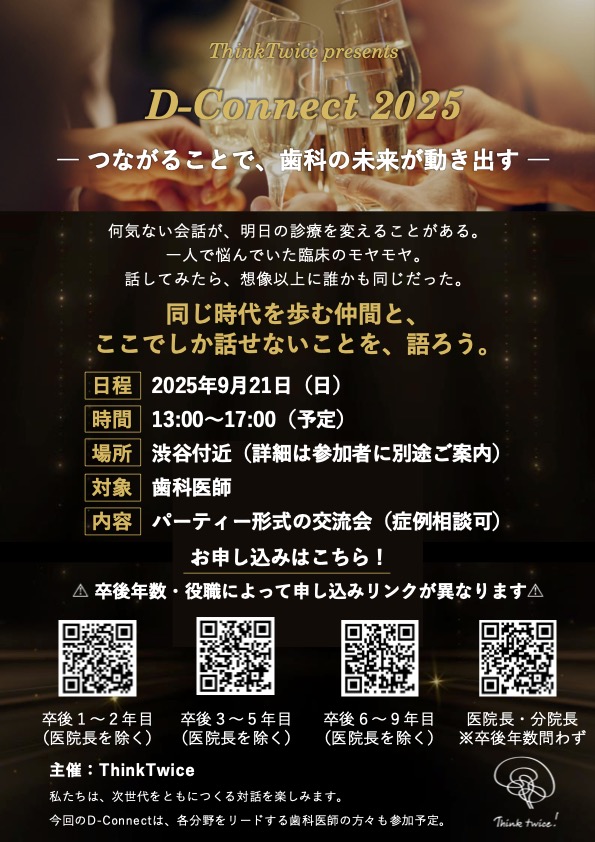
SCROLL

SEMINAR INFORMATION
セミナーのご案内
-
COURSE 01
院長先生向け リーダーシップ研修・コーチング
【月1回×6ヶ月 全6回コース】
あなたの理想の組織・医療を実現するためのリーダーシップを学びます。
一般論ではなく、あなたに必要なロードマップを描きます。
患者さんや、共に前進するスタッフとの良好な人間関係の為にまず自らが行動します。CONTACT -
COURSE 02
医院向け 予防歯科システム構築・理念構築
【月1回×医院に合わせてカスタマイズ】
一致団結。ワンチーム。言うは易く行うは難し。
歯科医療の実際を知る歯科医師が皆様の医院をファシリテートします。CONTACT -
COURSE 03
スタッフ向け マネージャー研修(石川)
【月1回×6ヶ月 全6回コース】
組織運営は経営者1人では行えません。「組織目線」を持ち前進するチームメンバーが必要です。
でも、どうしたら良いのか分からない。そんな声に応える研修です。ご要望に応じて組み立てます。
理念とは・人間関係の構築・評価制度・職務基準・新人教育の在り方・マニュアル・就業規則などです。CONTACT -
COURSE 04
歯科栄養療法アカデミー(長谷川)
【2ヶ月に1回 全6回コース】
歯科栄養療法の歯科医院での構築をお手伝い。
CONTACT -
COURSE 05
THINK TWICE 若手歯科医師向けセミナー
【月1回×12ヶ月 全12回】
ThinkTwiceが考える「人格主義歯科医療」「人格主義経営」の在り方を実践する若手歯科医師向けのコースです。さまざまな診療での悩みを解決して行きます。
CONTACT
-
COURSE 06
Think Twice DH セミナー
【6月2日 キックオフセミナー開催!】
デンツプライシロナ銀座ショールーム
CONTACT -
COURSE 07
D-Connect 2025
― つながることで、歯科の未来が動き出す ―
日程 時間 何気ない会話が、明日の診療を変えることがある。
一人で悩んでいた臨床のモヤモヤ。
話してみたら、想像以上に誰かも同じだった。
同じ時代を歩む仲間と、
ここでしか話せないことを、語ろう。
CONTACT
×
![]()
CONTACT
お問い合わせ
THINK TWICEにご興味をもっていただき誠にありがとうございます。
当コミュニティについて、セミナーについてなど
ご質問ございましたらこちらからお願いいたします。


